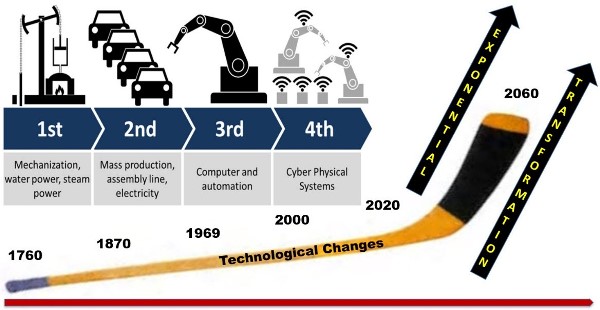For Project Business Management in the 4th Industrial Revolution
SECOND EDITION
By Darrel G. Hubbard, PE,
President & CEO, D.G.Hubbard Enterprises, LLC
California, USA
and
Peter W. Rogers, CEO, P17 Group LLC
Senior Consultant, The Experience Praxis Group, Inc.
Georgia, USA
INTRODUCTION
The new norm is a business environment where the challenges caused by Volatility, Uncertainty, Complexity, and Ambiguity (VUCA) are accelerating. The 4th Industrial Revolution is entering its exponential-change phase which is accelerating the disruptive VUCA forces that business, portfolio, program, and project leadership must address. This has created the VUCA-Accelerated (VUCAA) business conditions within today’s marketplace. This Fourth Industrial Revolution, the era of Digital Transformation commonly called “Industry 4.0,” arrived with the advent of the 21st century. Klaus Schwab, in his 2016 book, The Fourth Industrial Revolution [36], has opined that digitalization, emerging technologies, and broad-based-innovation will revolutionize everything. He noted that “major technological changes are on the brink of fueling momentous change throughout the world.”
Industry 4.0 refers to the current trend of extensive automation and data exchange in communications, manufacturing, production, and services, and the increasing miniaturization of technology. It is driving the integration of digital and physical technologies across all areas of business, society, production, mobility, and communications. This technological revolution is blurring the lines between the human, physical, digital, robotic, and biological spheres. It includes a wide range of current and coming changes, such as: cyber-physical systems; Internet of Things; Internet of Robotic Things; Internet of Systems; cloud computing; cognitive computing; predictive analytics; device interoperability; information transparency; decentralized decision-making; artificial intelligence; cognitive technologies; consumer software applications; smart manufacturing; ubiquitous mobile supercomputing; intelligent robots; self-driving cars; neuro-technological brain enhancements; genetic editing; technological convergence; integration of operational technology with information technology; combining big data and materials science; and bi-directional assistance between humans and machines [21].
Leaders in most industries are finally becoming aware of the emerging technologies that will drive disruptions within their marketplace. Those businesses are working on being able to function in the new digital economy that is driven by knowledge, powered by technology, and fueled by information. Fred Rogers, in his 2013 book Ride the Wave: How 12 Technologies Will Change the World and Make You Rich, and subsequent presentations at the Harvard Business School, has given his view on how information technologies will transform every aspect of people’s lives, and business and project management operations. Four of his points are:
- Moore’s Law will “keep rolling along” improving price-performance by at least 6400% before jumping on a totally new and steeper [exponential] performance curve;
- Over a trillion devices will be accessible on the world-wide-web by 2030 transforming virtually everything in our lives;
- By 2030, Artificial Intelligence (AI) combined with the Internet of Things (IoT) and robotics will grow the real American economy by roughly 80% – while the workforce will grow only 5%; and
- Information technology will provide transformative solutions to the mega-challenges of our age: health care, potable water, elder care, national security, transportation, global poverty, etc.
The speed of current breakthroughs has no historical precedent. When compared with the relatively linear changes brought by the three previous industrial revolutions, Industry 4.0 is evolving at an exponential rather than a linear pace – change and its related disruptions are accelerating as indicated below in Figure 1.
Figure 1: INDUSTRY 4.0 Disruptive Transformative Forces

The breadth and depth of these changes foreshadow the transformation of entire systems of production, management, governance, line-organizations, and whole enterprises. Moreover, major disruptions are happening in almost every industry in every country, and no enterprise is too big to fail. It used to be about the big eating the small; now the fast and agile annihilate the slow and ponderous. An International Data Corporation (IDC) report “FutureScape: Worldwide CIO Agenda 2016 Predictions [22]” emphasized that, “One-third of the top 20 firms in industry segments will be disrupted by new competitors within five years,” and that it is a matter of “transform or perish.”
By creating, applying, and embedding smart and connected technology, Industry 4.0 is transforming enterprises, economies, jobs, and even society and countries. Changes and innovation within the multilateral worldwide marketplace are now accelerating and this acceleration will be sustained. The related impacts can be seen in the multiple interrelated demographic, entrepreneurial, sociological, geo-political, structural, operational, economic, and technological disruptions that are continually occurring within the global marketplace.
These business disruptors are keeping project and business management operations in flux and demand timely, proactive, agile, and adaptive responses. This requires business analysis, systems thinking, active-listening, leveraging various forms of increased diversity, and a different mindset to move from reactive to proactive agile leadership within the operations, development, and project management disciplines.
More…
To read entire paper, click here
Editor’s note: Second Editions are previously published papers that have continued relevance in today’s project management world, or which were originally published in conference proceedings or in a language other than English. Original publication acknowledged; authors retain copyright. This paper was originally presented at the 13th Annual UT Dallas Project Management Symposium in May 2019. It is republished here with the permission of the author and conference organizers.
How to cite this paper: Hubbard, D.G., Rogers, P.W. (2019). A VUCAA-Mindset and VUCAA-Model for Project Business Management in the 4th Industrial Revolution; presented at the 13th Annual UT Dallas Project Management Symposium, Richardson, Texas, USA in May 2019; PM World Journal, Vol. VIII, Issue VII, August. Available online at https://pmworldlibrary.net/wp-content/uploads/2019/08/pmwj84-Aug2019-Hubbard-Rogers-VUCAA-Mindset-and-VUCAA-Model-in-4th-Industrial-Revolution.pdf
About the Authors

Darrel G. Hubbard, P.E.
California, USA
![]()
Darrel Hubbard is President of D.G.Hubbard Enterprises, LLC providing executive consulting and assessment services. He has over 50 years of experience in consulting, line management, and technical positions. He has served as a corporate executive officer; managed information technology, proposal, accounting, and project management organizations; managed the due diligence processes for numerous mergers and acquisitions; was a program manager on engineering projects; was a project manager on commercial projects; and a designated “key person” under government contracts. He has also held executive positions in, and was professionally licensed in, the securities and insurance industries.
He assists organizations, as a Subject Matter Expert (SME) consultant, to achieve their enterprise’s strategic business and tactical objectives. He provides analysis of their management structures, business processes, general business operations, and project and business management capabilities, while supplying specific recommendations on business, methodology, toolset, and process improvements. Mr. Hubbard also assists companies, as an out-side third party, with the intricacies of the due diligence process in their merger and acquisition activities. He also supports companies in the managerial development and establishment of Organizational Project Management (OPM) and their Project/Program/Portfolio Organizations (PMOs) and provides workshops and seminars focusing on the business management aspects of the project management discipline.
Mr. Hubbard holds a bachelor’s degree in mathematics and physics with a minor in chemistry from Minnesota State University at Moorhead. He is a registered Professional Engineer in Control Systems in California. Mr. Hubbard joined the Project Management Institute (PMI) in 1978 (#3662), is a charter member of the PMI San Diego Chapter, and was deputy project manager for the Project Management Body of Knowledge (PMBOK®) Guide Third Edition ANSI Standard by PMI. He was the Exhibitor Chairperson for the 1993 PMI North American Congress/Seminar/Symposium, is a published author of many articles, a presenter at many PMI Congresses and other Project Management Symposiums, a keynote speaker, and a guest speaker at PMI and IIBA Chapter meetings. Darrel is also a Life-Member of the International Society of Automation (ISA).
He is a contributing author to The AMA Handbook of Project Management, AMACOM, 1993 and The ABCs of DPC: A Primer on Design-Procurement-Construction for the Project Manager, PMI, 1997. He is the co-author with Dennis L. Bolles of The Power of Enterprise-Wide Project Management: Introducing a Business Management Model Integrating and Harmonizing Operations Business Management and Project Management, hardcover – AMACOM, NY, 2007; revised and retitled in paperback, The Power of Enterprise PMOs and Enterprise-Wide Project Management – PBMconcepts, MI, 2014; A Compendium of PMO Case Studies – Volume I: Reflecting Project Business Management Concepts – PBMconcepts, MI, 2012; and A Compendium of PMO Case Studies – Volume II: Reflecting Project Business Management Concepts – PBMconcepts, MI, 2016.
He can be contacted at Darrel.Hubbard@dghellc.com and LinkedIn at http://www.linkedin.com/in/DarrelGHubbard. Visit the PBMconcepts website at www.PBMconcepts.com for information about current and future book projects.

Peter W. Rogers
Georgia, USA
![]()
Peter Rogers is CEO of P17 Group LLC, and Senior Innovation Consultant at The Experience Praxis Group, Inc. He has over 40 years of experience in consulting, training, and executive management. He has served on boards of directors; and as head of an enterprise PMO; master facilitator; master trainer; master scheduler; lead consultant; portfolio, program, and project manager; adjunct professor and guest lecturer at Florida International University and several other colleges and universities; and speaker. Peter has founded and launched four of his own successful companies, and contributed to the startup and success of several other companies, including one that went public on NASDAQ.
Peter works with CEOs, top teams, other leaders, and managers in the space between strategy development and implementation to assure that organizations have the optimal structure, culture, and project/work delivery systems to achieve their goals and strategies. He assists with organizational restructuring and shifting culture to include a ‘culture of innovation’, and innovative and growth mindsets. He has provided these services to many Fortune 500 companies, including Microsoft, Starbucks, Chevron, Hewlett Packard, Boeing, PACCAR, Weyerhaeuser, Abbott, and others.
Peter holds a bachelor’s degree in biological oceanography, and masters’ degrees in economics and marine policy, all from the University of Washington, Seattle, Washington. He joined the Project Management Institute (PMI) in 1985 and was a work stream lead as a member of the core team of PMI’s Organizational Project Management Maturity Model (OPM3) project. He is a published author of several articles, a presenter at various project management symposiums, a keynote speaker, and a guest speaker at various functions. He has recently spoken at conferences in Dallas, Singapore, Shanghai, Prague, Noosa, and other locations on topics ranging from business agility and Agile, managing culture, managing innovation, to influencing, presenting, and emotional intelligence.
He is co-author of Project Management Made Simple and Effective, Dog Ear Publishing, IN, 2016, and contributing author to Business Innovation Results: How to Avoid 5 Innovation Traps the Doom Bottom-Line Results, Dog Ear Publishing, IN, 2017; Turn Great Ideas into Reality: Develop and Present a Winning Business Case, Dog Ear Publishing, IN, 2011; and Passing the PMI Scheduling Professional (PMI-SP) (c) Certification Exam the First Time, Dog Ear Publishing, IN, 2017.
He can be contacted at Peter@p17group.com and Peter.Rogers@experiencepraxis.com , and LinkedIn at https://www.linkedin.com/in/peter-rogers-982a7214/









